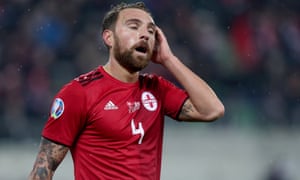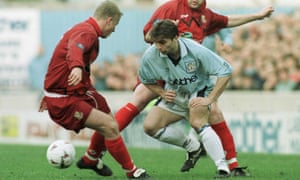Guram Kashia remembers the first time he set foot in the national stadium to watch Georgia. It was 1997 and a huge deal for a 10 year-old, whose father had pushed the boat out to afford tickets to watch a World Cup qualifier against Italy.
He can still list the visiting side from one to 11: Angelo Peruzzi in goal through to Gianfranco Zola in attack. It was the home lineup, though, that lit the fire: Shota Arveladze, Temuri Ketsbaia, Kakhaber Tskhadadze and the biggest genius among them all, Georgi Kinkladze. “They were the great, great players, the legends,” Kashia says. “A true inspiration for us. But they never had the chance we’ve got, and I know they would give everything to have it.”
If Georgia beat North Macedonia on Thursday at the same venue that first enchanted Kashia, their influential centre-back, they will qualify for the postponed Euro 2020. It is the apotheosis of Uefa’s pledge to send a smaller country to the tournament via the Nations League and, in that context, there is no doubting Georgia’s credentials.
They were the most fancied team in League D at the outset and swept through their group, winning five games and drawing one, before edging past Belarus in the play-off semi-finals last month. It is some transformation of scope for a country whose side have, since independence in 1991, bobbed around just below the probables and possibles.
“I always dreamed of it but never had the hope,” says Kashia, who is now 33 and plays for San Jose Earthquakes in the US. “The real ambition was to play in the Champions League or Premier League, because that’s achievable for a Georgian. But for the national team it was always like you had no chance, because you were competing with top teams that are obviously better than you. I never thought such a thing as this could happen.”
Georgia have never been whipping boys. They held Italy to a goalless draw on that formative night for Kashia, pulled off a similar feat against France and won a friendly in Spain four years ago. Mid-ranking sides are usually given a run for their money in Tbilisi and a 5-0 win over Wales in 1994 remains etched in the memories of those who travelled. There was little reason to doubt their technical wizardry, nor the grizzled tenacity of their defenders, but depth and clinical edge was usually lacking against the best.

“The Nations League has changed things for us,” Kashia says. “It gave us a huge chance but we really deserve to be where we are. We feel comfortable being the number one team on the field. We dominate, like to have the ball, like to create. Maybe we aren’t physically the strongest but quality-wise we have great players, especially the young ones.”
Unfortunately they will miss two of them against North Macedonia and it presents a headache for Vladimir Weiss, Georgia’s experienced Slovakian coach. Giorgi Chakvetadze, the brilliant Gent playmaker who has attracted glances from higher up, is absent with injury while the 19-year-old Rubin Kazan winger Khvicha Kvaratskhelia tested positive for Covid-19 on Tuesday. Levan Shengelia, another wide player, also has coronavirus and much may hinge on the form of Valeri Qazaishvili, Kashia’s teammate at San Jose.
Kashia accepts this team lack the star quality of past times, when Georgia’s squad would contain a handful of Bundesliga-based players and, particularly in the late 1990s, high-profile representation from England. But he thinks they are closer-knit, bridging geographical distance and the gaps between gatherings with plenty of Whatsapp activity and online PlayStation gaming.
Travelling to national team games frequently brings a side-effect of jet lag and the journey from California to the Caucusus late last week took 31 hours. But going to such lengths for the biggest game of his career was no hardship, even though the demands are about to be more intense than ever.

“My god, the pressure is there,” he says. “Family, friends, they only want to talk about this game and how excited they are.” It is a unifying moment for Georgians in a week that has brought demonstrations in Tbilisi over allegations that last week’s parliamentary election was rigged. Kashia, whose extensive efforts as a role model for diversity and inclusion won him Uefa’s first Equal Game award in 2018, might have hoped to leave such dramas across the Atlantic but the scene inside the ground will be considerably calmer given the Georgian authorities have not allowed fans to attend.
The hundreds of thousands watching on television may on tenterhooks if form is any guide. Georgia and North Macedonia met in Nations League ties – this year’s edition, with Thursday’s play-off an extension of the 2019-20 competition – as recently as September and October. They drew 1-1 both times and few would expect anything extravagant with the stakes so high now. The away side will miss key players of their own, including the Levante midfielder Enis Bardhi.
“I think you can predict the game a little bit,” Kashia says. “They’re defensive and really good with counters, we’re good with ball possession. It’ll be both teams playing a careful game and waiting for their chance. They’ll be looking for us to make a mistake, but we’re not going to do that.”
If that bears out, Georgia will break new ground and Kashia will enjoy the most satisfying return trip to the US of his life. “I’ll definitely have a hangover, and will have every right to it,” he says. “There will be hundreds of emotions, because it’s been a long journey. We are a small country, but a really proud one. Now we have our chance to put Georgia on the football map.”
from Football | The Guardian https://ift.tt/35lm4yb
via IFTTT

No Comment